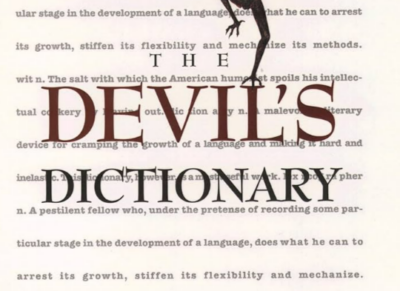54 Results in the "Non-Fiction" category
Biography & Memoir (434)
Books Like (8)
Business & Finance (26)
Children’s Fiction (203)
Dystopian (16)
Education & Learning (9)
Fantasy (1214)
fashion (1)
Fiction (4477)
Health & Wellness (21)
Historical Fiction (504)
Horror (159)
Literary Fiction (788)
Novel (229)
Others (106)
Philosophy (128)
Poetry (208)
Politics & History (131)
Posts (65)
Psychology (46)
Religion & Spirituality (1)
Romance Novel (535)
Science & Technology (82)
Science Fiction (220)
Self-Help & Personal Development (99)
Thriller / Mystery (858)
Travel & Adventure (2)
True Crime (55)
view (96)
Young Adult (284)
-
Chapter
Chapter D
 Chapter D sets the tone with the redefinition of Damn, a word that Bierce cleverly allows to shift in meaning depending on who defines it—be it theologian, philosopher, or common man. This ambiguity allows him to satirize how language, especially in moral contexts, is shaped more by perception than principle. Bierce uses the term to mock not just religious doctrine, but the human tendency to tailor judgment for convenience. Through this lens, condemnation becomes a flexible tool used selectively. His wit…
Chapter D sets the tone with the redefinition of Damn, a word that Bierce cleverly allows to shift in meaning depending on who defines it—be it theologian, philosopher, or common man. This ambiguity allows him to satirize how language, especially in moral contexts, is shaped more by perception than principle. Bierce uses the term to mock not just religious doctrine, but the human tendency to tailor judgment for convenience. Through this lens, condemnation becomes a flexible tool used selectively. His wit…-
82.1 K • Ongoing
-
-
Chapter
Chapter C
 Chapter C opens with Bierce’s knack for blending satire and sharp observation, starting with Caaba, a stone linked to Abraham that embodies religious ambiguity and human folly. By connecting it to the story of Babel, Bierce hints that divine worship often conceals confusion and vanity, turning sacred symbols into reminders of human error. This sets the stage for a series of definitions that unravel accepted meanings to reveal underlying absurdities in culture and belief. His humor highlights how even…
Chapter C opens with Bierce’s knack for blending satire and sharp observation, starting with Caaba, a stone linked to Abraham that embodies religious ambiguity and human folly. By connecting it to the story of Babel, Bierce hints that divine worship often conceals confusion and vanity, turning sacred symbols into reminders of human error. This sets the stage for a series of definitions that unravel accepted meanings to reveal underlying absurdities in culture and belief. His humor highlights how even…-
82.1 K • Ongoing
-
-
Chapter
Chapter B
 Chapter B begins with a look at Baal, a deity once worshipped across various ancient civilizations, often symbolizing power and natural forces. Bierce does not simply define Baal as a figure of mythology; he connects it to the confusion born of humanity’s attempts to build structures—literal and ideological—that reach too far. By referencing the story of Babel, he draws a line between the ambition to touch the divine and the chaos that follows. The implication is that veneration often disguises…
Chapter B begins with a look at Baal, a deity once worshipped across various ancient civilizations, often symbolizing power and natural forces. Bierce does not simply define Baal as a figure of mythology; he connects it to the confusion born of humanity’s attempts to build structures—literal and ideological—that reach too far. By referencing the story of Babel, he draws a line between the ambition to touch the divine and the chaos that follows. The implication is that veneration often disguises…-
82.1 K • Ongoing
-
-
Chapter
Chapter A
 Chapter A unfolds with Bierce’s familiar edge, starting with Abasement, which he defines not as humility, but as calculated submission—particularly in contexts of employment or authority. Rather than depicting it as a virtue, he recasts it as a social strategy, where people learn to shrink themselves in order to survive power dynamics. The sharpness of the definition cuts through the illusion of dignity in hierarchy. For Bierce, the act of lowering oneself is not noble, but necessary in systems built…
Chapter A unfolds with Bierce’s familiar edge, starting with Abasement, which he defines not as humility, but as calculated submission—particularly in contexts of employment or authority. Rather than depicting it as a virtue, he recasts it as a social strategy, where people learn to shrink themselves in order to survive power dynamics. The sharpness of the definition cuts through the illusion of dignity in hierarchy. For Bierce, the act of lowering oneself is not noble, but necessary in systems built…-
82.1 K • Ongoing
-
-
Chapter
Chapter 9 – Social Suggestion
 Chapter 9 – Social Suggestion explores the powerful, yet often unnoticed, influence that social environments have on shaping individual preferences, opinions, and behaviors. The chapter begins by discussing how social contexts subtly mold our perceptions of success and failure, particularly in areas like entertainment, art, and fashion. It asks the reader to reflect on how often personal tastes are shaped not by independent thought but by the collective sentiment of a group. Through anecdotes, the author…
Chapter 9 – Social Suggestion explores the powerful, yet often unnoticed, influence that social environments have on shaping individual preferences, opinions, and behaviors. The chapter begins by discussing how social contexts subtly mold our perceptions of success and failure, particularly in areas like entertainment, art, and fashion. It asks the reader to reflect on how often personal tastes are shaped not by independent thought but by the collective sentiment of a group. Through anecdotes, the author…-
202.8 K • Ongoing
-
-
 Chapter 9 - "Climbers" in England draws attention to a curious spectacle—the tireless efforts of certain Americans to enter the ranks of English high society. The fascination is mutual, yet often tinged with confusion and condescension. While Americans arrive with enthusiasm, expecting glamour and influence, they are met with cold scrutiny and a subtle caste system rooted more in tradition than merit. The so-called “Little Englander” mindset, with its quiet pride and national rigidity, resists…
Chapter 9 - "Climbers" in England draws attention to a curious spectacle—the tireless efforts of certain Americans to enter the ranks of English high society. The fascination is mutual, yet often tinged with confusion and condescension. While Americans arrive with enthusiasm, expecting glamour and influence, they are met with cold scrutiny and a subtle caste system rooted more in tradition than merit. The so-called “Little Englander” mindset, with its quiet pride and national rigidity, resists…-
151.7 K • Ongoing
-
-
Chapter
Chapter 8 – Slouch
 Chapter 8 – Slouch delves into the troubling cultural habit of untidiness and lack of pride in appearance and environment that the author identifies as distinctly American. The narrative contrasts this with the more polished and meticulous nature of people and places in Europe, where attention to personal grooming and cleanliness is often considered a mark of respect and dignity. The author urges for a cultural shift toward tidiness, suggesting that this change should start in schools and extend to the…
Chapter 8 – Slouch delves into the troubling cultural habit of untidiness and lack of pride in appearance and environment that the author identifies as distinctly American. The narrative contrasts this with the more polished and meticulous nature of people and places in Europe, where attention to personal grooming and cleanliness is often considered a mark of respect and dignity. The author urges for a cultural shift toward tidiness, suggesting that this change should start in schools and extend to the…-
202.8 K • Ongoing
-
-
Chapter
Chapter 8 – Idling in Mid-Ocean
 Chapter 8 - Idling in Mid-Ocean offers more than a scenic voyage; it becomes a slow exhale from the pressures of the structured world. The open sea surrounds the traveler with silence and space, and in that vastness, the senses sharpen while the mind settles. There are no doors to knock on, no errands to run, no meetings to attend. This enforced stillness, rather than breeding impatience, fosters a rare kind of peace. Time stretches like the horizon, not bound by clocks but by meals, sunsets, and the soft…
Chapter 8 - Idling in Mid-Ocean offers more than a scenic voyage; it becomes a slow exhale from the pressures of the structured world. The open sea surrounds the traveler with silence and space, and in that vastness, the senses sharpen while the mind settles. There are no doors to knock on, no errands to run, no meetings to attend. This enforced stillness, rather than breeding impatience, fosters a rare kind of peace. Time stretches like the horizon, not bound by clocks but by meals, sunsets, and the soft…-
151.7 K • Ongoing
-
-
 Chapter 7 - Worldly Color-Blindness explores the subtle yet destructive effect of social misjudgment in hospitality, using the metaphor of literal color-blindness to reveal the consequences of emotional and cultural dullness. The chapter begins by contrasting physical impairments—like tone-deafness or visual deficiencies—with a far more common but less discussed issue: a lack of social discernment. In music or painting, some can overcome these limitations through technique or sheer will. But in…
Chapter 7 - Worldly Color-Blindness explores the subtle yet destructive effect of social misjudgment in hospitality, using the metaphor of literal color-blindness to reveal the consequences of emotional and cultural dullness. The chapter begins by contrasting physical impairments—like tone-deafness or visual deficiencies—with a far more common but less discussed issue: a lack of social discernment. In music or painting, some can overcome these limitations through technique or sheer will. But in…-
151.7 K • Ongoing
-
-
 Chapter 7 – The Discontent of Talent explores the stark contrast between the complacency of ordinary individuals and the constant yearning for improvement that characterizes those with exceptional abilities. The author begins by critiquing those who are self-satisfied with their lives, viewing their established customs and routines as beyond question. Such individuals, content in their ignorance, resist change and innovation. In contrast, the gifted and imaginative, particularly those who have traveled…
Chapter 7 – The Discontent of Talent explores the stark contrast between the complacency of ordinary individuals and the constant yearning for improvement that characterizes those with exceptional abilities. The author begins by critiquing those who are self-satisfied with their lives, viewing their established customs and routines as beyond question. Such individuals, content in their ignorance, resist change and innovation. In contrast, the gifted and imaginative, particularly those who have traveled…-
202.8 K • Ongoing
-
- Previous 1 … 21 22 23 … 31 Next
